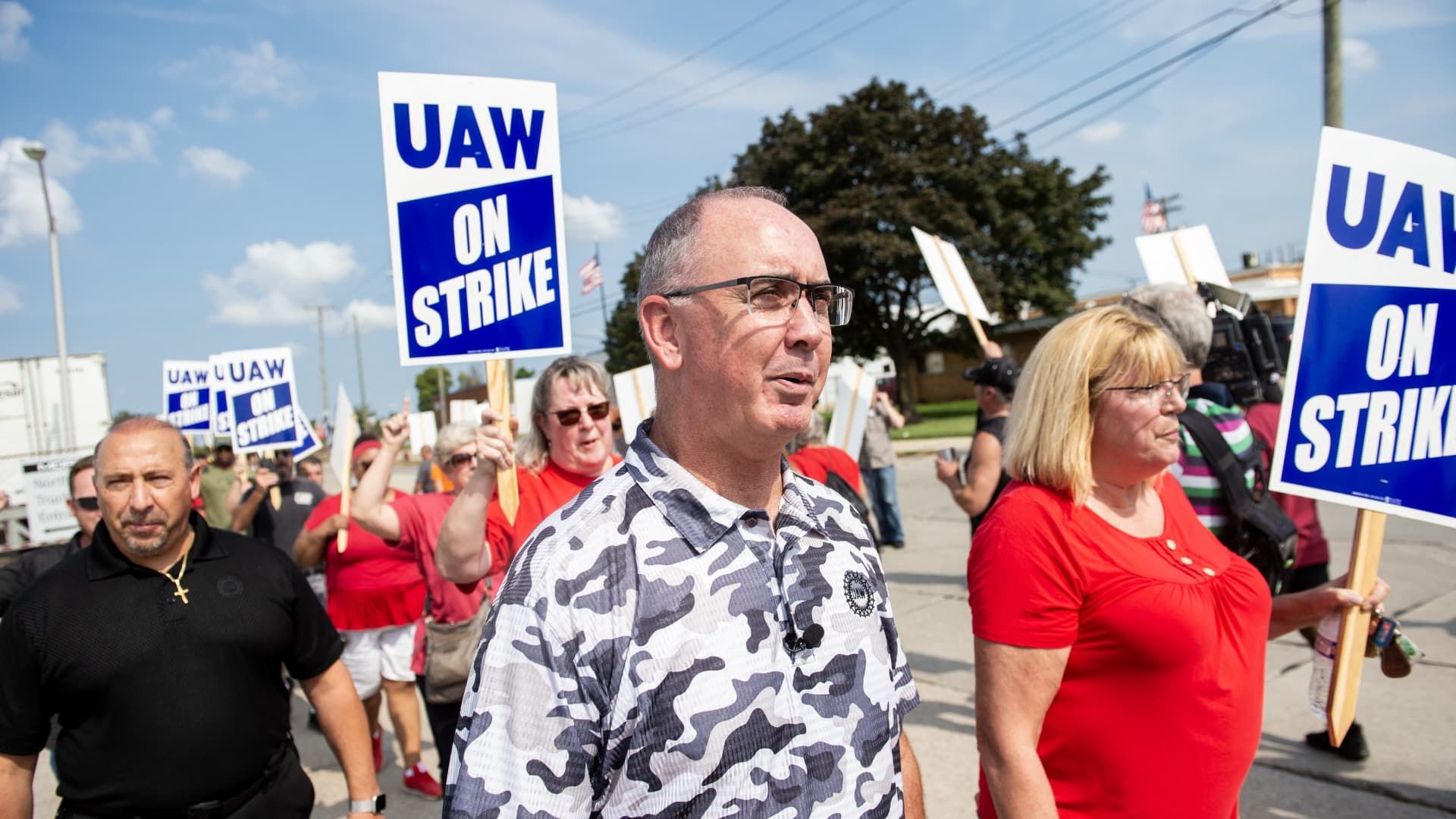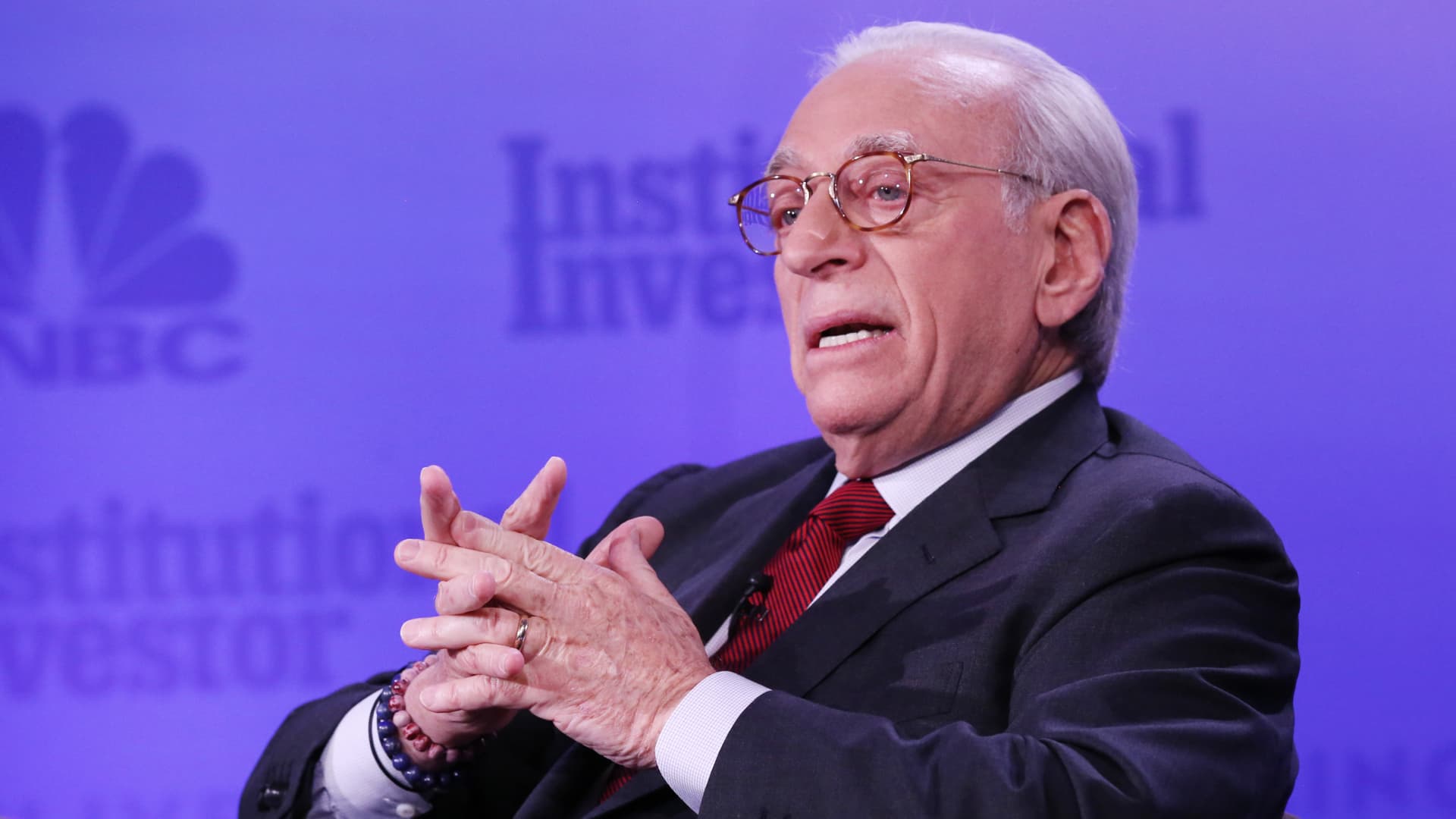UAW President Shawn Fain and members and workers at Mopar Parts Center Line, a Stellantis parts distribution center in Center Line, Michigan, picket outside the facility after walking off the job at noon on Sept. 22, 2023.
Matthew Hatcher | AFP | Getty Images
DETROIT – A year after unprecedented strikes by the United Auto Workers union against Detroit automakers, the union is again threatening work stoppages that could disrupt the U.S. auto industry.
The UAW announced a strike deadline on Wednesday in a Ford Engine tool and die plant that supports the automaker's Rouge Complex near Detroit, one of two U.S. plants that produce the company's highly profitable F-150 pickup truck.
The Sept. 25, 11:59 p.m. strike deadline came a day after UAW President Shawn Fain announced plans to hold strike authorization votes at one or more local unions covering Stellantis Plants in the USA
Both announcements are warnings against Ford and Stellantis and focus on union contracts and local issues at the facilities. The union has not announced similar actions against General Motors.
UAW members are covered by national agreements, which cover issues such as wages, bonuses and other benefits, as well as local contracts tailored to each facility.
Historically, local contracts took months, if not years, to be finalized after a national agreement was reached. Sometimes, they were not even finalized during the validity of the national agreement.
Last year's autoworkers' strikes came during historic national contract negotiations with all three Detroit automakers at the same time. The union won record wage increases (25 percent over the term of the agreement) and the reinstatement of cost-of-living adjustments, but labor experts said it could come at the cost of jobs.
Ford's most recent strike deadline was called due to negotiations at the local plant involving “job security, wage parity for skilled workers, as well as work rules,” according to the union.
A strike at a subsidiary facility of an assembly plant could disrupt vehicle assembly if the automaker fails to come up with contingency plans for parts. The plant employs fewer than 500 workers.
Ford, in a statement Thursday, said negotiations with the union are ongoing: “Ford invested $15 million in the plant last year and we have been at the bargaining table to resolve the issues. Negotiations continue and we look forward to reaching an agreement with UAW Local 600 at Dearborn Tool & Die.”
The strike deadline takes tensions there a step further than at Stellantis, where the union has announced it will vote on strike authorization. Strike authorization votes are procedural. They are votes by workers to authorize UAW leaders to call a strike, if warranted. These votes for national contract negotiations typically pass with more than 90% worker approval.
The announced vote at Stellantis comes after months of smears by Fain against Stellantis and its CEO Carlos Tavares following product cuts, layoffs and other actions the union has deemed detrimental to unionized workers, including the potential to move production of vehicles like the Dodge Durango outside the U.S.
The union filed unfair labor practice claims with the National Labor Relations Board against Stellantis on Monday, alleging the automaker refused to “provide the union with relevant information” about investments and products.
“The company wants us to be afraid, but we are 100% within our right and within our power to strike if necessary,” Fain said Tuesday evening during an online broadcast.
Stellantis has maintained that such a strike would be illegal.
Stellantis CEO Carlos Tavares speaks to the media on June 13, 2024 after the company's investor day at its North American headquarters in Auburn Hills, Michigan.
Michael Wayland / CNBC
Fain has insisted that the union won the right to strike over the automakers' investment and product commitments during national negotiations. However, there are still clauses in the contracts regarding market conditions, the economy and other factors that could grant the company leniency.
On Tuesday night, after Fain's strike authorization vote was announced, the company criticized the union leader for his actions and comments.
“Shawn Fain continues to claim that the company has breached its contract, but to date has provided no data or information to support his claims. Instead, he continues to deliberately damage the company's reputation with his public attacks, which benefits no one, including its members,” the company said in an emailed statement.
Stellantis said a strike “does not benefit anyone: our customers, our distributors, the community and, most importantly, our employees.”
In addition to the complaint filed Monday with the NLRB against the company, Fain said 28 Stellantis local unions have filed grievances against the automaker. Those grievances cover about 98% of the Stellantis workforce represented by the UAW, according to the union.
“Once we authorize a strike at a location, we meet with the company seven times and resolve the issue or take strike action as our union sees fit,” Fain said.
As of earlier this year, Stellantis employed approximately 43,000 union-represented workers.
The union also began contract negotiations with Volkswagen this week. VW workers in Chattanooga, Tennessee, voted overwhelmingly in favor of UAW representation earlier this year.










